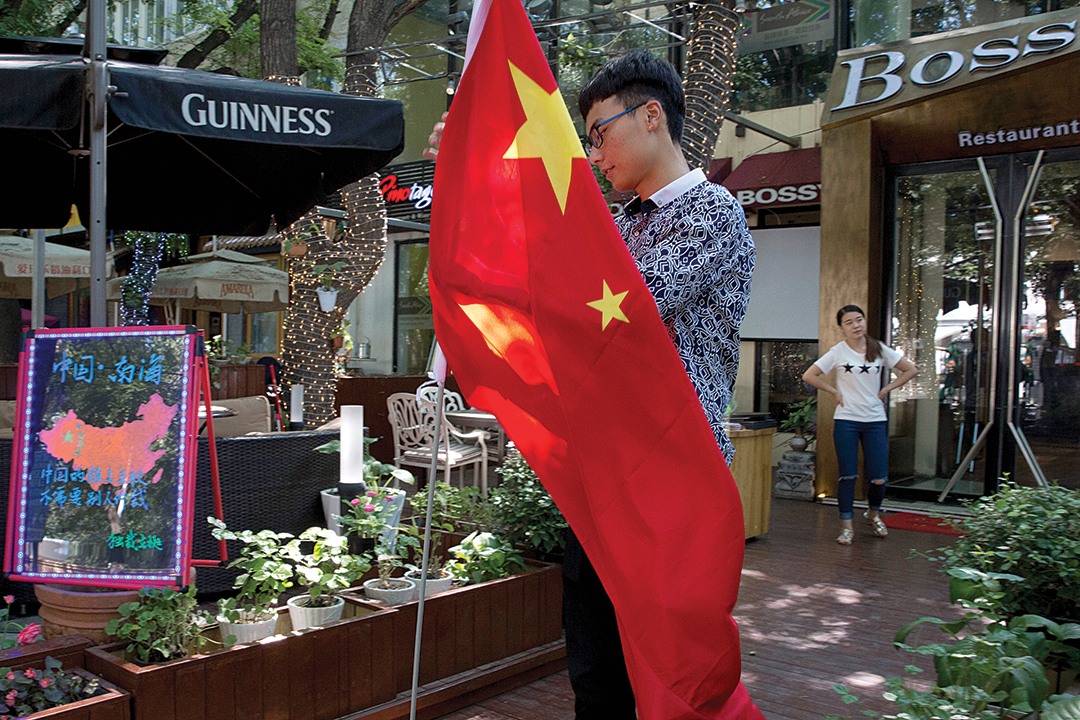By Joseph Vann, Marshall Center professor
Photos by The Associated Press
If one were to look at the current depth and breadth of Chinese engagement activity in Europe — meaning its economic, scientific, cultural, political, academic and social engagement activities throughout Europe — it would look similar to the Chinese board game Go (known as Wei-chi). Those unfamiliar with the game would only need to understand that it is a game of strategy and encirclement. More challenging than chess and estimated to have more options for moves than the number of atoms in the known universe, Go is a combination of grand strategies, operational art and tactical battles played out concurrently. Unlike chess, where all pieces are on the board at the beginning of the game, in Go, pieces are added to the board as the game advances — much like the way Chinese engagement activity in Europe has developed and continues to unfold.
The parallels between Go and Chinese activity in Europe are worth considering. Go is a revered game in Chinese culture and has been played for centuries. It is often referenced in the teachings of Confucius and Sun Tzu. It has even been used to make sense of Mao’s revolutionary strategy behind his Long March. Former U.S. Secretary of State Henry Kissinger is said to be a proponent of understanding the game in the context of understanding Chinese strategy.
Like the game of Go, Beijing’s engagement in Europe is a strategy of encirclement in an advanced state of play. Across Europe, China is heavily involved in business acquisitions, infrastructure projects, academic collaboration, research and development agreements, think tank sponsorship, and panda diplomacy, all of which is being heavily funded and orchestrated with the oversight of the Chinese Communist Party (CCP) leadership. Acquisitions of European businesses have covered the spectrum from energy to advanced technologies to health care, with an increasing focus on sensitive high-tech sectors. In all aspects of Beijing’s engagement, Chinese state influence and overwatch run very high.
In assessing Chinese engagement activity, it is important to understand that this is not only about investments and acquisitions. It is about much more, namely influence and the effective employment of soft power. A clear example is the importance that Beijing gives to its United Front Work Department, which exists to oversee the CCP’s influence operations. China’s well-known disinformation and propaganda capabilities, having been perfected at home, are now in play in Europe. China has invested a reported $3.5 billion in European media outlets, giving it a unique platform to influence media content. A study by AMO, a nongovernmental organization and nonprofit based in Prague, detailed a correlation between Chinese investments in European media and the subsequent shift away from negative and neutral reporting to only positive coverage of China.
China’s foray into European media is just one example of this strategic encirclement methodology. In 2019, the European Parliament raised questions about Serbia’s “Safe City” project, which is essentially a high-tech law enforcement surveillance system that features advanced facial recognition technology built by the Chinese company Huawei and Chinese state-owned manufacturer Hikvision. The questions in this case centered on a section of the Chinese National Security Law that requires the companies to relay data in their possession to Beijing’s intelligence services.
Questions about how these seemingly individual initiatives support Beijing’s One Belt, One Road strategy deserve study. However, there is little transparency in the world of the CCP. Unlike Western democracies, Beijing’s authoritarian and centrally directed nature allows it to encourage or compel its state-owned enterprises and other businesses to follow investment strategies that align with its long-term national strategy. As a result, Beijing is able to choreograph a national effort that can be executed globally toward achieving strategic outcomes. Perhaps the clearest example is the visible alignment of European investments and acquisitions that directly support its “Made in China 2025” industrial master plan aimed at making China a technology superpower.

Looking at the U.S. experience, doing business with China came with immense costs. Companies, focusing on quick investment returns, willfully transferred an incalculable amount of intellectual property to Chinese companies as the price of doing business in China. Thinking that they would be able to weather trade conditions or invent new technology proved shortsighted. Beijing’s perseverance in forcing foreign companies to give up their intellectual property as a condition of doing business saved Chinese companies from the long and costly research and development process. The aggregate effects of gaining technological insight in so many different business sectors allowed Beijing to propel China’s economy forward in an incredibly short time — something it would have been very unlikely to have achieved on its own.
This is not to say that the Chinese have not been smart. They have been incredibly smart and very pragmatic in understanding how Western democracies work. Over the past two decades, Beijing has excelled in exploiting the seams and vulnerabilities in Western governments and business sectors. The CCP is centrally directed and able to task-organize like a major global business conglomerate. This allows Beijing to dictate roles and responsibilities to be implemented by Chinese industry and its various state organs.
But looking at the bigger picture, it is less about China being smart and more about the West being sloppy. Typically, a generation is defined as about 20-30 years. Collectively, the West appears to be suffering from generational dynamics that impair its ability to play the strategic long game. Today’s Western decision-makers in government and business are generally younger and part of the post-Cold War generation. An appreciation of all that led to establishing the current 70-plus-year-old rules-based international order is likely not well understood, fully appreciated, or a very pronounced factor guiding long-term policymaking and economic decisions.
Similarly, Beijing has demonstrated disdain for rules and agreements it finds inconvenient and has enjoyed decades of not being held accountable. This lack of accountability is trending more aggressively and deserves the attention of Western leaders. Its island-building in the South China Sea has proceeded unchecked. After losing its 2016 case in the South China Sea Arbitration under the United Nations Convention on the Law of the Sea, Beijing simply rejected the finding. Separately, the United Kingdom’s government has called out Beijing for violating the terms of the 1984 Sino-British Joint Declaration guaranteeing Hong Kong’s rights and freedoms as part of the agreement returning Hong Kong to Chinese rule in 1997. The U.K. was clear in its statement: “Beijing’s decision to impose radical changes to restrict participation in Hong Kong’s electoral system constitutes a further clear breach of the legally binding Sino-British Joint Declaration … part of a pattern designed to harass and stifle all voices critical of China’s policies.” China’s imprisonment of an estimated 1 million Uyghur Muslims and its maltreatment of the larger Uyghur population in its Xinjiang region is another example of Beijing’s attitude of impunity when it comes to abiding by international norms.

Other examples of disdain for international law are equally egregious. According to the U.S. Cybersecurity and Infrastructure Security Agency (CISA), cyber activities attributed to the Chinese government targeted, and continue to target, industries and organizations in the U.S., including those in health care, financial services, the defense industrial base, energy, government facilities, chemical, critical manufacturing (including automotive and aerospace), communications, information technology (including managed service providers), international trade, education, video gaming, faith-based organizations and law firms. CISA further revealed that China is conducting operations worldwide to steal intellectual property and sensitive data from critical infrastructure organizations, including organizations involved in health care, pharmaceuticals and research working on COVID-19 responses.
China became a member of the World Trade Organization just over 20 years ago and has proved to be a formidable economic player. Now, as either the largest or second-largest economy in the world, depending on how one chooses to measure, China’s role in the economic battlespace is indisputable. This begs the question of what the future holds. Our critical dependence on Chinese supply chains hit home in Europe and elsewhere during the COVID-19 pandemic. However, the pandemic should not have been the wake-up call. Beijing is doing many things that should trouble us, but we lack an ability to see them in aggregate, and this serves to diminish the seriousness of Beijing’s actions and its effect on Europe.
As we take stock of what has transpired over the past 20 years, it is clear that we have collectively allowed Beijing to dictate terms for play on its nonlevel field. We have been foolishly expecting positive change to eventually take place. Sadly, there has been no positive change — only an emboldened and more capable Beijing that continues to be enabled by Western naiveté. Once again, events have driven home the adage: “Hope is not a strategy.” Maintaining Europe’s core values should not be negotiable. Coming to terms with this reality is now an unavoidable strategic imperative.


Comments are closed.